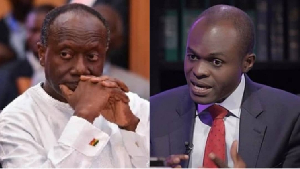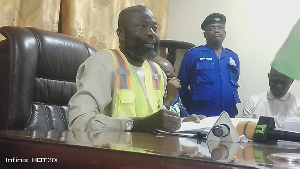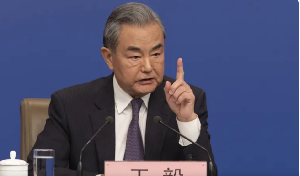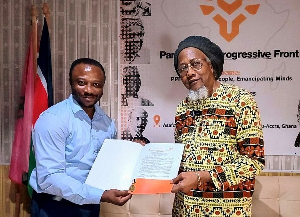According to the German/African Magazine "Afrika post" by Carsten Habaker:
Internet crime, drug trafficking, arms smuggling are current issues in West Africa, increasingly particularly in Ghana and are emerging far-reaching so-called African Criminal Networks (ACN), which significantly affect everyday life and undermine public institutions more and promote such criminalities due to probably the inability of the state to create effective mechanisms that could prevent the growth of the criminal networks.
While crime in West African countries has often been a "national origin" the criminal gangs are now increasingly problematic. With their machinations they pave their way relatively easy in those countries.
The need for cooperation between public authorities at national, regional and international levels, particularly at national borders is obvious. While this threat is well recognized, but virtually nothing is stirring, it completely gives opposite and positive developments on the criminal side, for instance criminal gangs in Ghana and Nigeria easily develop transnational networks in the whole West African sub-region.
West Africa in recent news reports already called "the new drug triangle" simply because it is the preferred alternative hub for Colombian drug cartels for their goods to Europe and North America and further to South Africa. This is particularly heroin from South and South-east Asia and cocaine from South America. The Kotoka International Airport in Accra plays a crucial role as a hub, furthermore the ports of Tema and Sekondi are used as well as the border post Aflao (Togo), Elubo and Sampa (Cote d'Ivoire).
In 2004 alone, in Ghana, about 620 tons of cocaine were seized, 71 tonnes of heroin and 765 tons of cannabis. The magnitudes are significant. In practice, the trade in drug(s) looks as follows: The drug dealers operate in a complex system, in which the bosses remain the main financiers and completely unidentifiable, they take trusted related people that organize the trade. These organizers are recruiting the messengers or carriers, which are responsible for pushing the goods from one place to another. They often used security personnel. The messengers also take additional people who transport the drugs in so-called body-packs in the body varying from case to case. The messenger usually have no contact with the real architect of the deal. The number of people involved (layers) depend on the amount of the transaction. Approximately 10-15% of applied financial resources remain in the country and be spent on storage, transport and bribery.
In Germany, almost a third of those arrested for drug offences are criminals from West Africa. In Austria alone there are over 1,100. In Europe arrested West Africans revealed the disturbing fact that the executive bodies on the ground in Africa are not able to master the criminal networks. They are now completely incapable of tracking down the African Criminal Networks(ACN's).
The negative influence of such groups in the population is enormous. Very special are the Ghana Police Service and other law enforcement agencies, judicial, banking, customs and political parties affected. A problem in the investigation seems to be the structuring of such ACN's because they are able to finance their way through.
Another point is the increasingly transnational dimension, because the source was mostly in Ghana and Nigeria, but today it is rampant across Africa. Issues such as lack of interest by state officials, bribery, corruption and infiltration work within government institutions like an invisible helping hand. Also due to the widespread youth unemployment it is easy to recruit new staff to work for the ACN's. because the subject ACN's has no hierarchical order.
Experts argue that the origins of the crime network developments in the West African countries are subject to the economic crisis in the 1980s, economic mismanagement, failure of structural adjustment programs, ongoing political dispute and ongoing harsh military regime. It therefore developed some "branches" of crime thus, cabal crime, drug trafficking, weapons production and smuggling.
The criminal networks has mutual trust and reciprocity as an internal mechanism for conflict prevention and is essential for cohesion and solidarity in the group. Many interviews with the police show that violence in the ACN's house as a means of achieving the target does not play any role to stop them so if there are such cases the authorities remain ineffective due to lack of capability or the consequence that some executives will be exposed.
Attempts by the Ghanaian police to infiltrate criminal groups fail, since infiltration in the opposite direction is simply more effective the criminals have an easy time to expose undercover agents. This make the security agents generally lack the interest of doing any deeper investigations in all the special criminal industries and this gives the criminals too the opportunity to wash behind the backs of the actual law enforcement enormous amounts of money to facilitate finance in all directions.
The members of ACN's or persons who are involved in this, have very different professional backgrounds and dramatically increase the effectiveness of their diversity of their actions. Even some networks members are accountants, lawyers, judges, security personnel and employees of various "useful" together companies and organizations. The role of the judge is particularly important since they represent a support when something goes wrong and members are arrested and also to possibly influence individual politicians.
In the manufacture and smuggling of firearms, this is something different. These networks are very well organized hierarchically into guilds of 10-15 members. In some parts the number of members raise up to 50, when integrated in the production process, other auxiliary or ancillary products. As in any production process there are internal hierarchical order chains and some form of division of labour. The integrated in this process workers are specialized to only a small part of the production process to keep the quality and efficiency as high as possible.
Rules and conditions vary in such a guild entirely in the respective region of Ghana. In areas with particularly high unemployment, for example, is very easy to recruit workers. In some regions, this may even reach the proportions in which it is generally only way to survive financially, especially if there are members of large families. There are also legal differences between the regions in Ghana. The trade and production rules in the Volta region are much stricter than those in the regions of Ashanti, Central or Northern Region.
Unconfirmed reports from individual producers that there are contacts with India and the Philippines to exchange skills and expertise of the weapons industry. The production of weapons through old colonial laws which are today still banned in Ghana. The end products of the illegal arms manufactured in Ghana and West Africa sub-region throughout such high regard and are of high quality. Although these weapons are officially banned, many locally produced weapons are regularly registered by police as foreign weapons.
Deciding whether something is legal or illegal, in Africa seems to be justified historically difficult. It is also in Ghana an unofficial but strong dualism in the legal system. One side is official and is based on state laws, the other hand is unofficial and is based on traditions and cultural backgrounds. Realistically the official law is in the traditional embedded and both are interdependent. This leads to trouble and confusion, as the Ghanaian people are forced to follow the modern law, but is itself a moral obligation to respect the traditions.
It was during the period of British occupation that the inhabitants of present-day Ghana forged their own weapons and the British made it more grief than any other Africans. Now one can imagine that a prohibition of weapons production meets with disapproval. From the perspective of the Ghanaian system, they are the owners of an important tradition that is practised to serve the society to which they belong. Implemented laws of Western society, which old trade practices between ethnic groups as smuggling and technological advances classified as criminal encounter, while opposition.
The African country, Ghana show piece has obviously problems with its law enforcement agencies, police and other security services. To become master of the above crimes, it is absolutely necessary to improve information sharing between national and international security forces of ECOWAS Member States. Appropriate training must take place, logistical and material grievances must be overcome. In addition, institutional framework conditions must be created for infiltration of criminalities. This requires political will, skilled staff and a strong and independent judiciary, otherwise the (Democratic African) drugs transit country, Ghana could become a drug consuming country.
From the German/Afrcan Magazine "Afrika post" by Carsten Habaker:
FRANCIS TAWIAH (Duisburg - Germany)
Opinions of Saturday, 23 April 2011
Columnist: Tawiah, Francis














